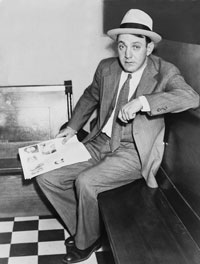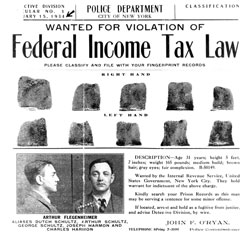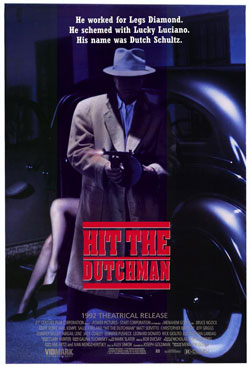
Lucky Luciano. John Dillinger. Al Capone. Gangsters from 1920s and 1930s are part of our American heritage. We know their names and the violence they inflicted. In many ways they exemplify the American dream, because they beat the economic system and acquired immense wealth and power. And no gangster did it with more flare than Arthur Flegenheimer, better known as Dutch Schultz.
I discovered Schultz reading E.L. Doctorow's novel Billy Bathgate. Doctorow portrayed Schultz as a near-schizophrenic gangster. But as I read more about Schultz, he seemed more like a hotheaded entrepreneur who constantly adjusted his business practices to meet the demands of the market, whether that business was running booze, the numbers racket, or murder. And Schultz's business acumen fascinated me and scared me alike.
A native New Yorker, Schultz was born on August 6, 1901. He dropped out of school and sold newspapers to support his single mother. It was hard work, and what he really wanted was easier money, so he started robbing craps games. Schultz wasn't a very good thief. He was arrested when he was eighteen years old. When the police asked for his name he invented his first alias, the all-American sounding Charles Harmon.
Schultz was subsequently sentenced to one year in Blackwell's Island Prison (which is now Roosevelt Island). Upon his release, he went to work for Schultz Trucking, a company that smuggled beer and whiskey into New York. And he changed his name again, to Dutch Schultz. He reportedly joked that his real name was too long to appear in the headlines. (This is just one account of how Schultz chose his nickname.)
But Schultz wasn't satisfied with simply being an employee. He was an entrepreneur at heart and developed an alcohol production and delivery system that would make him a millionaire. In 1928, Schultz became partners in a speakeasy called the Hub Social Club. But the cost of transporting alcohol from New Jersey was expensive, so Schultz bought a fleet of trucks and went into the distribution business. He soon began selling beer to speakeasies all over New York, and quickly became known as “The Beer Baron of the Bronx”. To discourage his competition, he kidnapped competitors and hung them on meat hooks.
Soon, the entrepreneur in Schultz became dissatisfied with being a distributor, too. He entered into the liquor distilling business, and began construction of a distillery inside an old cow barn in Pine Plains, N.Y.
On December 5, 1933, at the height of the Great Depression, Prohibition was repealed, and Schultz had to find another line of work. He found two. First, he formed the Metropolitan Restaurant & Cafeteria Owners Association, which was supposed to represent the interests of restaurant owners. The business plan was simple. Restaurant owners paid a tribute of $25,000 a year, and they were left alone. If a restaurant owner refused to pay, Schultz wasn't above throwing a stink bomb into their dining room, or coercing the restaurant's employees to walk off their jobs.
Schultz also got into the numbers racket, which worked much like a Pick 3 Lottery. The winning numbers were derived from the last three digits of the total amount of money bet at the horse races. And Schultz rigged the results. Everyday, Schultz's accountant, math wiz Otto “Abbadabba” Berman, would figure out how much money Schultz needed to bet at the races in order to make the most profit.
Schultz was an innovator in other ways, too. He paid his “workers” a salary rather than a cut of the proceeds. Otto Berman's weekly pay was rumored to be $10,000 a week, and Schultz's gross income was estimated to be at a couple of million dollars a month. Tax free.

Schultz soon became one of the richest men in New York. He also garnered a big enemy, New York Special Prosecutor Thomas E. Dewy, who was determined to crack down on organized crime. Dewey charged Schultz for tax evasion. [wanted poster included.] But Schultz had a scheme. He tried to pay $100,000 to the IRS. The IRS refused the money, saying he owed much more than that. At his trial, which was held in Syracuse, New York, Schultz pleaded not guilty. He claimed the government refused to accept his tax payment. It was a hung jury, and he was released.
Afraid that the Feds would try again to abscond with his money, Schultz is rumored to have buried $7 million in cash and government bonds by the Esopus Creek in Phoenicia, New York. The treasure was never found, and today, it would be valued at more than $50 million dollars.
And, true to Schultz's fears, the government retried his case. This time, the trial was held in the tiny village of Malone, N.Y. Schultz arrived a week before the trial and charmed everyone. He gave toys to sick kids, and contributed to all the local churches. The trial lasted a week, yet the jury deliberated only one day. The verdict? Not guilty, and the courtroom erupted with applause.

On October 24, 1935 in Newark, New Jersey, Schultz was gunned down by order of Lucky Luciano. His deathbed statement contains the famous line, “A boy has never wept…nor dashed a thousand kim.” I don't know what that line means. Probably nobody does. The same goes for the rest of his statement. Perhaps that's why it became the inspiration for Beat Generation author William S. Burroughs' The Last Words of Dutch Schultz.
Schultz's life and death also made him fodder for filmmakers. He's been portrayed in the films Portrait of a Mobster (1960), The Cotton Club (1984), Billy Bathgate (1991), Hit the Dutchman (1992), The Outfit (1993), and Hoodlum (1997).
Television shows that featured Schultz's legacy include Unsolved Mysteries: The Dutch Schultz treasure, Biography: Dutch Schultz, History Channel: Dutch Schultz, and The Lawless Years – The Dutch Schultz Story.
Schultz also fascinates the public off-screen. For example, his old distillery in Pine Plains is being renovated into a modern-day distillery and museum. And each year, fortune hunters pack up their metal detectors and congregate in Phoenicia to search for his buried treasure.
Schultz's life continues to fascinate me, too. But if I had the chance, would I want to meet him? No. I'd be terrified, even though he always represented himself as an average guy. A salesman. That was even the occupation listed on his death certificate. He once told a reporter, “I never did anything to deserve that reputation (Public Enemy No. 1), unless it was to supply good beer to people who wanted it.”
Joel Gomez-Dossi has done a lot of things in his life, and some of them he'll even admit to. He started his career as a stage manager, and then he became a television production manager. Now he practices the world's second oldest profession, telling stories. He is the author of two novels published by Bold Strokes Books, Pursued and Deadly Cult.

Fascinating account of a man who created his own opportunities because he wasn’t afraid of violating the law or of hurting other people. Meat hooks?? Ugh! So, Joel, should we buy a couple of shovels and meet in Phoenicia?
I’m up for it. Phoenicia is a fun little town, right next to Woodstock. Lot of hippies and gangsters!